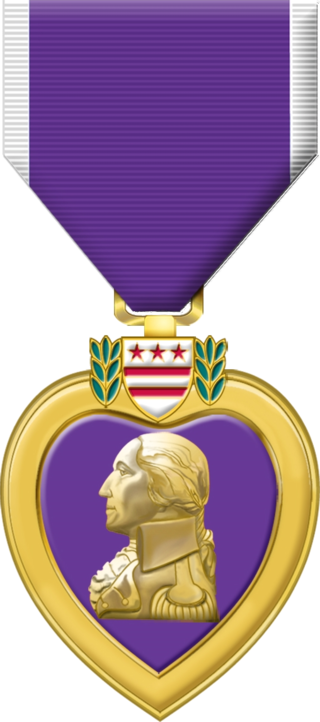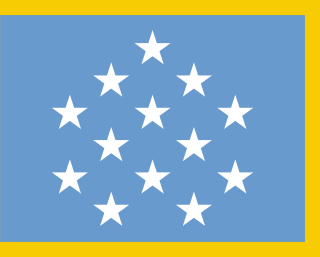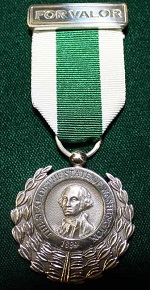
The Bronze Star Medal (BSM) is a United States Armed Forces decoration awarded to members of the United States Armed Forces for either heroic achievement, heroic service, meritorious achievement, or meritorious service in a combat zone.

The Legion of Merit (LOM) is a military award of the United States Armed Forces that is given for exceptionally meritorious conduct in the performance of outstanding services and achievements. The decoration is issued to members of the eight uniformed services of the United States as well as to military and political figures of foreign governments.

The Purple Heart (PH) is a United States military decoration awarded in the name of the President to those wounded or killed while serving, on or after 5 April 1917, with the U.S. military. With its forerunner, the Badge of Military Merit, which took the form of a heart made of purple cloth, the Purple Heart is the oldest military award still given to U.S. military members. The National Purple Heart Hall of Honor is located in New Windsor, New York.

United States law enforcement decorations are awarded by the police forces of the United States of America. Since the United States has a decentralized police force, with separate independent departments existing on the state and local level, there are thousands of law enforcement decorations in existence.

The orders and decorations conferred upon civilians and military personnel in the Republic of the Philippines are listed by orders of precedence. Philippine civilian orders and decorations are conferred by the President of the Philippines in his or her capacity as head of state. In certain instances, the conferment of certain orders and decorations requires the concurrence of the Congress of the Philippines, or of certain advisory bodies.

The Public Safety Officer Medal of Valor is the highest decoration for bravery exhibited by public safety officers in the United States, comparable to the military's Medal of Honor.
Awards and decorations of the United States Department of the Air Force are military decorations which are issued by the Department of the Air Force to airmen of the United States Air Force and guardians of the United States Space Force and members of other military branches serving under Air Force and Space Force commands.
Awards and decorations of the United States government are civilian awards of the U.S. federal government which are typically issued for sustained meritorious service, in a civilian capacity, while serving in the U.S. federal government. Certain U.S. government awards may also be issued to military personnel of the United States Armed Forces and be worn in conjunction with awards and decorations of the United States military. In order of precedence, those U.S. non-military awards and decorations authorized for wear are worn after U.S. military personal decorations and unit awards and before U.S. military campaign and service awards.

The Washington Medal of Merit is one of three statutory civilian decorations issued by the state of Washington, the others being the Washington Medal of Valor and the Washington Gift of Life Award. Washington law does not describe an order of precedence for state decorations, though the Medal of Merit is generally considered the state's highest honor.
Awards and decorations of the state defense forces are presented to members of the state defense forces in addition to regular United States military decorations and state National Guard military decorations. Each of the state governments of the United States maintains a series of decorations for issuance to members of the state defense forces, with such awards presented under the authority of the various state adjutants general and/or respective state defense force commanders.

The Illinois State Police(ISP) is the state police agency of the state of Illinois. The Illinois State Police is responsible for traffic safety on more than 300,000 miles of total roadway, including 2,185 miles of Interstate Highways and 15,969 miles of State Highways. In 2021, the ISP Division of Patrol handled more than 48,000 traffic crashes, conducted more than 68,000 motor carrier safety inspections, and made more than 4,500 DUI arrest. The Division of Criminal Investigation opened 930 violent crime cases, opened 124 homicide cases, seized 1,590 firearms, handled 64 public integrity cases, and ensured 595 Firearm Owner Identification (FOID) card holders were in compliance. Currently, almost 3,000 sworn and civilian personnel make up the Illinois State Police.

The Stolen Valor Act of 2005, signed into law by President George W. Bush on December 20, 2006, was a U.S. law that broadened the provisions of previous U.S. law addressing the unauthorized wear, manufacture, or sale of any military decorations and medals. The law made it a federal misdemeanor to falsely represent oneself as having received any U.S. military decoration or medal. If convicted, defendants might have been imprisoned for up to six months, unless the decoration lied about is the Medal of Honor, in which case imprisonment could have been up to one year. In United States v. Alvarez (2012), the Supreme Court of the United States ruled that the Stolen Valor Act of 2005 was an unconstitutional abridgment of the freedom of speech under the First Amendment–striking down the law in a 6 to 3 decision.
The United States Department of State, like other agencies of the U.S. federal government, gives civilian decorations for outstanding service, sacrifice, or heroism. The criteria for the awards are set down in 3 FAM 4820 - Foreign Affairs Manual, 3 FAM - Personnel, section 3 FAM 4800 Department Awards Program.

The Secretary of the Army Award for Valor was established 15 April 2002, to acknowledge acts of heroism or bravery connected with an Army employee or Army activity, or that in some way benefits the Army. The performance of the act must be evidenced by voluntary action above and beyond the call of duty. The equivalent military decoration for this award is the Soldier's Medal.
The Orders, decorations, and medals of Guyana were established after Guyana gained independence from the United Kingdom. In 1970 Guyana became a Republic and established its first two national awards under the Constitution of the Orders of Guyana. In 1976, the Constitution of the Orders of Guyana was amended to add a third national award.

The Medal of Honor (MOH) is the United States Armed Forces' highest military decoration and is awarded to recognize American soldiers, sailors, marines, airmen, guardians and coast guardsmen who have distinguished themselves by acts of valor. The medal is normally awarded by the president of the United States, the commander-in-chief of the armed forces, and is presented "in the name of the United States Congress," it is sometimes referred to as the "Congressional Medal of Honor". The Secretary of the Army, on behalf of DoD, has testified to Congress that the term "Congressional Medal of Honor" is "incorrect" as a matter of statute, and that "it seems inappropriate to modify the name of the medal with the word 'Congressional' as each award is made in the name of the Congress," through a mandated process in the military chain of command, not 'by' Congress, and there is no other Medal of Honor, so no need for the modifier.

The Washington Medal of Valor is one of three statutory civilian awards and decorations issued by the state of Washington, the others being the Washington Medal of Merit and the Washington Gift of Life Award. Washington law does not describe an order of precedence for state decorations, though the Medal of Valor is generally considered the state's second-highest honor, after the Medal of Merit.
The Greek honors system goes back to 1829 and the establishment of the Order of the Redeemer at the Fourth National Assembly at Argos. However, the relevant decree was signed in Nafplio by King Otto on May 20, 1833. The Grand Cross of the Order of the Redeemer remains the highest honor of Greece to this day.
Awards and decorations of the Texas government are bestowed by various agencies of the Texas government to citizens, employees, or service members for acts of accomplishment, meritorious service, eminence in a field, or a specific heroic act.











